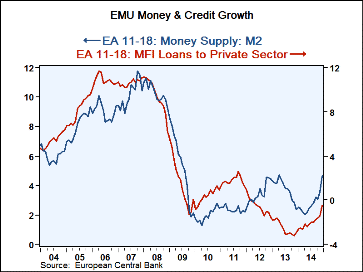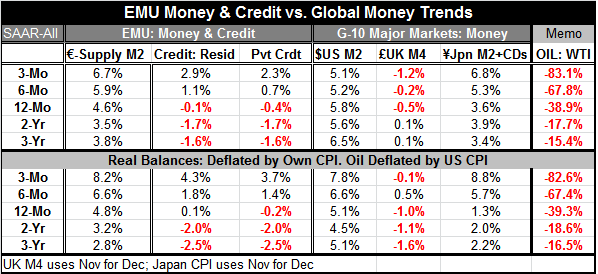 Global| Jan 29 2015
Global| Jan 29 2015EMU Money and Credit Struggle Higher
Summary
EMU money and credit growth in December show signs of making progress. Money is steadily accelerating and rising at a strong 6.7% annual rate over three months. In real terms, money growth is up to an 8.2% annual rate over three [...]
 EMU money and credit growth in December show signs of making progress. Money is steadily accelerating and rising at a strong 6.7% annual rate over three months. In real terms, money growth is up to an 8.2% annual rate over three months. But year-over year month growth is still held to a pace of 4.6%.
EMU money and credit growth in December show signs of making progress. Money is steadily accelerating and rising at a strong 6.7% annual rate over three months. In real terms, money growth is up to an 8.2% annual rate over three months. But year-over year month growth is still held to a pace of 4.6%.
Credit growth in the EMU is the real story as it is soaring, posting positive growth rates over three months and six months as of December. Credit growth has been moribund or worse since it fell sharply in 2008 and registered halting growth rates from 2009 onward. Private sector credit growth has been negative for three years in a row and now it is posed to turn positive.
U.S. money supply growth has been steady to weaker over the past year. U.K. money growth has been flat to lower. Japan, with its own accelerating QE program in place, has seen money growth accelerate steadily. In real terms, U.S. money growth is accelerating along with Japan, but money growth in the U.K. is still flat.
The EMU is better positioned to try to stimulate the economy and credit growth in an environment in which credit already has turned the corner. The chart shows that momentum has swung relatively strongly to the upside for year-over-years trends in money and private credit as of December.
The test will be to see if credit growth can be stimulated not just in the aggregate but across the euro area, especially in the countries that need growth the most. The ECB QE program is geared to do that by putting the local QE apparatus in the hands of the local central banks. While the gains in money supply have been brewing for some months, the turn up in credit is much more recent with a sharp gain in December accounting for nearly all of the uptrend in that series. In the last ten months apart from December, credit has been up month-to month only twice and by 0.1% on each occasion. It is far too soon to call the credit implosion over in the EMU. But if the December gain stands up, it is a good base for QE to build upon.
For 34 straight months, EMU money growth has been positive while EMU credit growth has been contracting. Obviously, a situation in which money growth is accelerating and credit growth is positive would represent a very different state of affairs for Europe.
But the table reminds us that the forces of deflation are severe as oil prices are falling at a still stepped up pace. German states have reported such weak results that it looks like Germany will report outright deflation, a falling price level, in January. Deflation will make positive gains in money and credit hard to achieve; let alone to sustain in the European Monetary Union.

Robert Brusca
AuthorMore in Author Profile »Robert A. Brusca is Chief Economist of Fact and Opinion Economics, a consulting firm he founded in Manhattan. He has been an economist on Wall Street for over 25 years. He has visited central banking and large institutional clients in over 30 countries in his career as an economist. Mr. Brusca was a Divisional Research Chief at the Federal Reserve Bank of NY (Chief of the International Financial markets Division), a Fed Watcher at Irving Trust and Chief Economist at Nikko Securities International. He is widely quoted and appears in various media. Mr. Brusca holds an MA and Ph.D. in economics from Michigan State University and a BA in Economics from the University of Michigan. His research pursues his strong interests in non aligned policy economics as well as international economics. FAO Economics’ research targets investors to assist them in making better investment decisions in stocks, bonds and in a variety of international assets. The company does not manage money and has no conflicts in giving economic advice.
More Economy in Brief
 Global| Feb 05 2026
Global| Feb 05 2026Charts of the Week: Balanced Policy, Resilient Data and AI Narratives
by:Andrew Cates






